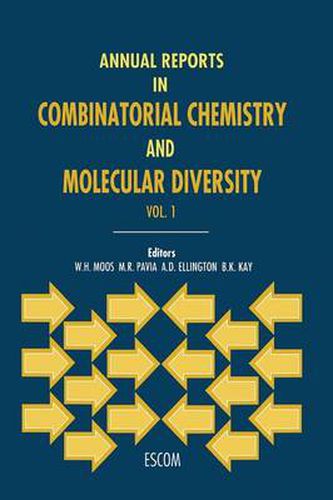Readings Newsletter
Become a Readings Member to make your shopping experience even easier.
Sign in or sign up for free!
You’re not far away from qualifying for FREE standard shipping within Australia
You’ve qualified for FREE standard shipping within Australia
The cart is loading…






This title is printed to order. This book may have been self-published. If so, we cannot guarantee the quality of the content. In the main most books will have gone through the editing process however some may not. We therefore suggest that you be aware of this before ordering this book. If in doubt check either the author or publisher’s details as we are unable to accept any returns unless they are faulty. Please contact us if you have any questions.
Combinatorial chemistry and molecular diversity approaches to scientific inquiry and novel product R&D have exploded in the 1990s! For example, in the preparation of drug candidates, the automated, permutational, and combinatorial use of chemical building blocks now allows the generation and screening of unprecedented numbers of compounds. Drug discovery - better, faster, cheaper? Indeed, more compounds have been made and screened in the 1990s than in the last hundred years of pharmaceutical research.
This first volume covers: (i) combinatorial chemistry, (ii) combinatorial biology and evolution, and (iii) informatics and related topics. Within each section chapters are prepared by experts in the field, including, for example, in Section I: Coverage of mixture pools vs. parallel individual compound synthesis, solution vs. solid-phase synthesis, analytical tools, and automation. Section II highlights selection strategies and library-based evolution, phage display, peptide and nucleic acid libraries. Section III covers databases and library design, high through-put screening, coding strategies vs. deconvolutions, intellectual property issues, deals and collaborations, and successes to date.
$9.00 standard shipping within Australia
FREE standard shipping within Australia for orders over $100.00
Express & International shipping calculated at checkout
This title is printed to order. This book may have been self-published. If so, we cannot guarantee the quality of the content. In the main most books will have gone through the editing process however some may not. We therefore suggest that you be aware of this before ordering this book. If in doubt check either the author or publisher’s details as we are unable to accept any returns unless they are faulty. Please contact us if you have any questions.
Combinatorial chemistry and molecular diversity approaches to scientific inquiry and novel product R&D have exploded in the 1990s! For example, in the preparation of drug candidates, the automated, permutational, and combinatorial use of chemical building blocks now allows the generation and screening of unprecedented numbers of compounds. Drug discovery - better, faster, cheaper? Indeed, more compounds have been made and screened in the 1990s than in the last hundred years of pharmaceutical research.
This first volume covers: (i) combinatorial chemistry, (ii) combinatorial biology and evolution, and (iii) informatics and related topics. Within each section chapters are prepared by experts in the field, including, for example, in Section I: Coverage of mixture pools vs. parallel individual compound synthesis, solution vs. solid-phase synthesis, analytical tools, and automation. Section II highlights selection strategies and library-based evolution, phage display, peptide and nucleic acid libraries. Section III covers databases and library design, high through-put screening, coding strategies vs. deconvolutions, intellectual property issues, deals and collaborations, and successes to date.